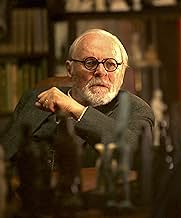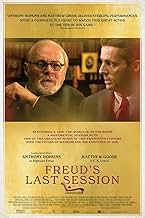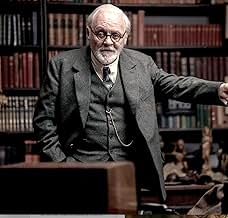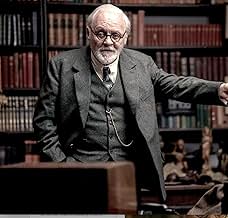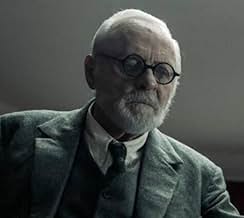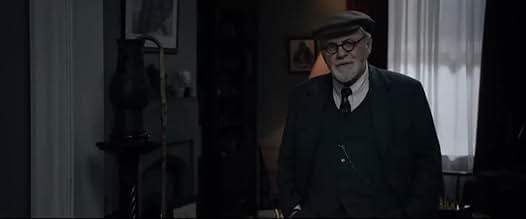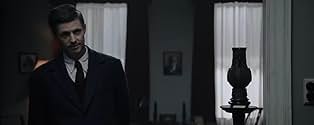Freud invita l'iconico autore Clive Staples Lewis a discutere dell'esistenza di Dio.Freud invita l'iconico autore Clive Staples Lewis a discutere dell'esistenza di Dio.Freud invita l'iconico autore Clive Staples Lewis a discutere dell'esistenza di Dio.
- Regia
- Sceneggiatura
- Star
- Premi
- 1 candidatura in totale
George Andrew-Clarke
- Paddy Moore
- (as a different name)
Anna Amalie Blomeyer
- Ilsa
- (as Anna Blomeyer)
Recensioni in evidenza
Strictly evaluated as an opening-to-closing credits endeavor, Freud's Last Session isn't a terrific film (probably more like 6-stars). But director/writer Matt Brown's effort features enough interesting philosophical nuggets-bolstered by one terrific acting performance-to be enjoyable for those who may sit down to watch it.
For a very basic overview, Freud's Last Session imagines a fictional encounter-which may or may not have actually occurred-between the titular psychoanalyst (Anthony Hopkins) and Christian apologist C. S. Lewis (Matthew Goode). As the two trade philosophical worldviews in Freud's home, the doctor's daughter Anna (Liv Lisa Fries) struggles with her own relationship with her famous father alongside a closeted relationship with colleague Dorothy Burlingham (Jodi Balfour).
I'm not entirely sure if Freud's Last Session has ever been produced as a stage play, but if so that might actually be the better format for it. With the core of the film being an intellectual sparring match between two academics, it's a bit of an odd fit for a big-screen format or presentation. Brown tries to flesh things out with the Freud daughter plotline and various flashbacks, but those avenues feel a bit forced and ultimately serve to take the focus off the "main event".
Fortunately, the movie has two things squarely in its corner: First, the back-and-forth repartee truly does raise some food for thought (if treading somewhat familiar religion vs atheism ground). A few lines really stuck with me. Secondly, Hopkins continues to provide transformative performances. Fans of his won't regret the admission just based on his turn alone here.
Overall, I settled on 7/10 stars for Freud's Last Session. Technically it isn't even "that good" of a flick, but the Hopkins performance and general setup are enough that those even nominally interested in the premise can find enough to enjoy.
For a very basic overview, Freud's Last Session imagines a fictional encounter-which may or may not have actually occurred-between the titular psychoanalyst (Anthony Hopkins) and Christian apologist C. S. Lewis (Matthew Goode). As the two trade philosophical worldviews in Freud's home, the doctor's daughter Anna (Liv Lisa Fries) struggles with her own relationship with her famous father alongside a closeted relationship with colleague Dorothy Burlingham (Jodi Balfour).
I'm not entirely sure if Freud's Last Session has ever been produced as a stage play, but if so that might actually be the better format for it. With the core of the film being an intellectual sparring match between two academics, it's a bit of an odd fit for a big-screen format or presentation. Brown tries to flesh things out with the Freud daughter plotline and various flashbacks, but those avenues feel a bit forced and ultimately serve to take the focus off the "main event".
Fortunately, the movie has two things squarely in its corner: First, the back-and-forth repartee truly does raise some food for thought (if treading somewhat familiar religion vs atheism ground). A few lines really stuck with me. Secondly, Hopkins continues to provide transformative performances. Fans of his won't regret the admission just based on his turn alone here.
Overall, I settled on 7/10 stars for Freud's Last Session. Technically it isn't even "that good" of a flick, but the Hopkins performance and general setup are enough that those even nominally interested in the premise can find enough to enjoy.
There is a recent outbreak of films made for people past puberty and this film is one of them. Serious issues are discussed. Thoughts are provoked. Both actors (and the actresses who get less flamboyant screen time) play intelligent philosophers grappling with something we all have to face - is there an eternity? Or oblivion? What prompts a genocide by humans to eliminate theirnown species? No flying cars or superheros, just intelligent adults grappling with serious questions.
Anthony Hopkins fills his unpleasant character with a minimum of scenery chewing, and Matthew Goode was a pleasant surprise, keeping his more quiet character in the mental battle. But the little known story of Anna Freud is tragic and brings real emotion to the story. A grown up film (sorry, Barbie).
Anthony Hopkins fills his unpleasant character with a minimum of scenery chewing, and Matthew Goode was a pleasant surprise, keeping his more quiet character in the mental battle. But the little known story of Anna Freud is tragic and brings real emotion to the story. A grown up film (sorry, Barbie).
Hopkins playing Freud was bound to be hit or miss. Unfortunately, he delivers here one of his familiar, highly mannered performances. Whenever this "Freud" opens his mouth, he speaks in the same rapid, slightly eccentric rhythm Hopkins favors. Then he pauses, reflects a moment, flashes a sudden rueful grin, and utters a little chuckle or cackle. It's been Hopkins' default style throughout his career (at least when not playing Lecter), this time with a Viennese accent. I doubt Freud was ever so hammy.
My faith was also shaken early in the movie when, for no discernible reason, the order of two famous events was reversed. On September 3, 1939, Prime Minister Chamberlain announced over the radio that the nation was at war with Germany. A few minutes later, air raid sirens went off, terrifying London's populace. (It proved to be a false alarm.) For some reason, the movie has the false air raid preceding the declaration of war.
It also features, in connection with Chamberlain's broadcast, an old bête noire of mine: A large group of psychologists is listening to his historic speech on the radio, and when it's over, the BBC announcer says something like "That ends the Prime Minister's message" -- at which point someone (is it Anna Freud?) snaps off the radio. No one would do that in real life, with war just declared and with urgent government announcements yet to follow (and there were plenty of them).
One further complaint: the clumsy way flashbacks are shoehorned into the narrative, giving us the backstories of Freud, Lewis, and Anna, with a heavy emphasis on Anna's lesbianism.
Incidentally, considering that C. S. Lewis was one of the most brilliant speakers in Britain -- eloquent, persuasive, never at a loss for words -- he is uncharacteristically tight-lipped, timid, and hesitant in this movie, even for someone being courteous to a revered, dying old man. Armand Nicholi's fanciful book "The Question of God," one of the inspirations for this movie, lets the two iconic figures battle it out, with Lewis (and God) ultimately gaining the upper hand. But in this movie's version of that imaginary encounter, Lewis has little to say. It is all Freud's show.
At least the movie is handsomely mounted; it's nice to see what Freud's office must have looked like. That aside, I can't see the point of the movie. Is it just to give Hopkins the chance to do another bad impersonation of a historical figure?
My faith was also shaken early in the movie when, for no discernible reason, the order of two famous events was reversed. On September 3, 1939, Prime Minister Chamberlain announced over the radio that the nation was at war with Germany. A few minutes later, air raid sirens went off, terrifying London's populace. (It proved to be a false alarm.) For some reason, the movie has the false air raid preceding the declaration of war.
It also features, in connection with Chamberlain's broadcast, an old bête noire of mine: A large group of psychologists is listening to his historic speech on the radio, and when it's over, the BBC announcer says something like "That ends the Prime Minister's message" -- at which point someone (is it Anna Freud?) snaps off the radio. No one would do that in real life, with war just declared and with urgent government announcements yet to follow (and there were plenty of them).
One further complaint: the clumsy way flashbacks are shoehorned into the narrative, giving us the backstories of Freud, Lewis, and Anna, with a heavy emphasis on Anna's lesbianism.
Incidentally, considering that C. S. Lewis was one of the most brilliant speakers in Britain -- eloquent, persuasive, never at a loss for words -- he is uncharacteristically tight-lipped, timid, and hesitant in this movie, even for someone being courteous to a revered, dying old man. Armand Nicholi's fanciful book "The Question of God," one of the inspirations for this movie, lets the two iconic figures battle it out, with Lewis (and God) ultimately gaining the upper hand. But in this movie's version of that imaginary encounter, Lewis has little to say. It is all Freud's show.
At least the movie is handsomely mounted; it's nice to see what Freud's office must have looked like. That aside, I can't see the point of the movie. Is it just to give Hopkins the chance to do another bad impersonation of a historical figure?
It's a contrast-intellectual-perspectives-on-God drama set on September 3, 1939, in London, England at the home of 83-year-old Sigmund Freud (Anthony Hopkins), and his daughter, Anna (Liv Lisa Fries). The Freuds had fled Vienna, Austria in 1938 after Anna had been briefly detained. Freud was severely suffering from oral cancer and taking a lot of morphine at the date in question. Freud did not believe in God, despite early training in both Catholicism and Judaism.
Freud's last intellectual visitor in this fictional account is C. S. Lewis (Matthew Goode), a 45-year-old Oxford don, and Christian apologist after rediscovering faith in the early 1930s.
The film follows the conversation between Freud and Lewis, with various flashbacks at key including Freud's youth and Lewis's experiences in World War I. The film also touches on Anna's relationship to her father and to Dorothy Burlingham (Jodi Balfour), a former patient of Sigmund's and close friend of Anna. The film also notes Lewis's conversion and his unusual relationship with Janie Moore (Orla Brady), the mother of Lewis's wartime comrade, Paddy Moore (George Andrew-Clarke).
"Freud's Last Session" has Freud and Lewis punch holes in their opponent's perspectives on God, with neither landing a knock-out. The flashbacks and inserts related to Anna provide some breaks. Hopkins and Goode are excellent while burdened with what felt like a pretty flat script. It was a kind of gamesmanship without much direction.
Freud's last intellectual visitor in this fictional account is C. S. Lewis (Matthew Goode), a 45-year-old Oxford don, and Christian apologist after rediscovering faith in the early 1930s.
The film follows the conversation between Freud and Lewis, with various flashbacks at key including Freud's youth and Lewis's experiences in World War I. The film also touches on Anna's relationship to her father and to Dorothy Burlingham (Jodi Balfour), a former patient of Sigmund's and close friend of Anna. The film also notes Lewis's conversion and his unusual relationship with Janie Moore (Orla Brady), the mother of Lewis's wartime comrade, Paddy Moore (George Andrew-Clarke).
"Freud's Last Session" has Freud and Lewis punch holes in their opponent's perspectives on God, with neither landing a knock-out. The flashbacks and inserts related to Anna provide some breaks. Hopkins and Goode are excellent while burdened with what felt like a pretty flat script. It was a kind of gamesmanship without much direction.
It's 1939 on the very eve of declaration of War in London. Oxford don C. S. Lewis (Matthew Goode) calls upon Sigmund Freud (Anthony Hopkins) at his invitation. He passes Anna Freud (Liv Lisa Fries) as she goes out to lecture and ponder whether she will reveal her lesbian affair to her father. Meanwhile, the two men attack each other's philosophical beliefs.
And that's what the movie is, two men talking, interrupted occasionally by flashbacks to their younger days and air raid to lend this stage play some cinematic credibility. In this made-up scenario -- although the story is that an Oxford don visited Freud shortly before his death, the claim, as here, that it was Lewis, is a fabrication of the play and movie -- they argue around each other, and finally agree only that people are afraid of death.
The rest of it.... well, Freud's beliefs are at the end of his life (he died three weeks after the supposed events of this film), while there are plenty of things that Lewis did say until twenty years after. As for the basic disagreement about religion versus science, that's a non-conflict; as smarter people than I have declared, science is about how, not why. If G*d created the universe we live in, thanks a lot.
Both men are fine actors and easily translate the script into natural-sounding words. I have no idea if Hopkins' accent is a good representation of the Viennese one; Kohli Calhoun is listed as the dialect coach.
And that's what the movie is, two men talking, interrupted occasionally by flashbacks to their younger days and air raid to lend this stage play some cinematic credibility. In this made-up scenario -- although the story is that an Oxford don visited Freud shortly before his death, the claim, as here, that it was Lewis, is a fabrication of the play and movie -- they argue around each other, and finally agree only that people are afraid of death.
The rest of it.... well, Freud's beliefs are at the end of his life (he died three weeks after the supposed events of this film), while there are plenty of things that Lewis did say until twenty years after. As for the basic disagreement about religion versus science, that's a non-conflict; as smarter people than I have declared, science is about how, not why. If G*d created the universe we live in, thanks a lot.
Both men are fine actors and easily translate the script into natural-sounding words. I have no idea if Hopkins' accent is a good representation of the Viennese one; Kohli Calhoun is listed as the dialect coach.
Lo sapevi?
- QuizAnthony Hopkins had previously portrayed C.S. Lewis in Viaggio in Inghilterra (1993) 30 years prior to this film.
- BlooperLewis refers to JRR Tolkien as "John". He was known as "Ronald" to his friends.
- Citazioni
J.R.R. Tolkien: Jack, when you read myths about gods that come to Earth and sacrifice themselves, their stories move you, so long as you read it anywhere but the Bible.
- ConnessioniFeatured in The 7PM Project: Episodio datato 19 aprile 2024 (2024)
- Colonne sonoreVariations on an Original Theme, Op. 36, 'Enigma' Variation 9: Nimrod
Composed by Edward Elgar
Performed by Symfonický orchester Slovenského rozhlasu (as Slovak Radio Symphony Orchestra) & Adrian Leaper (Conductor)
Licensed courtesy of Naxos Music UK Ltd
I più visti
Accedi per valutare e creare un elenco di titoli salvati per ottenere consigli personalizzati
- How long is Freud's Last Session?Powered by Alexa
Dettagli
- Data di uscita
- Paesi di origine
- Lingue
- Celebre anche come
- La Última Sesión de Freud
- Luoghi delle riprese
- Aziende produttrici
- Vedi altri crediti dell’azienda su IMDbPro
Botteghino
- Lordo Stati Uniti e Canada
- 906.283 USD
- Fine settimana di apertura Stati Uniti e Canada
- 45.590 USD
- 24 dic 2023
- Lordo in tutto il mondo
- 4.190.596 USD
- Tempo di esecuzione1 ora 50 minuti
- Colore
Contribuisci a questa pagina
Suggerisci una modifica o aggiungi i contenuti mancanti

Divario superiore
What is the Canadian French language plot outline for Freud - L'ultima analisi (2023)?
Rispondi





